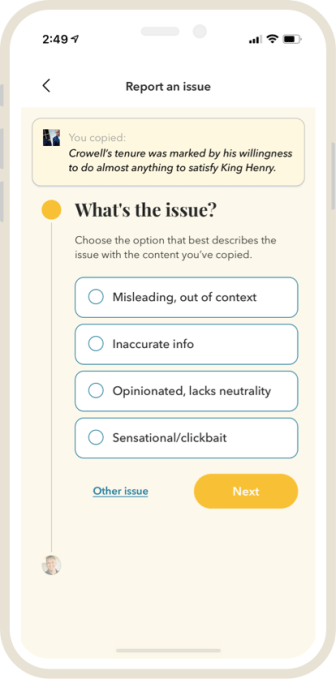A new startup called Gawq wants to tackle the problem of fake news and the “echo chamber” problem created by social media, where our view of the world is shaped by manipulative algorithms and personalized feeds. Through Gawq’s newly launched mobile news app, it aims to present news from a range of sources, while allowing users to filter between news, opinion, paid content and more, as well as compare sources, check facts and even review the publication’s content for accuracy.
The idea for Gawq comes from Joshua Dziabiak, co-founder and now board member at the now profitable insurance tech startup The Zebra. Dziabiak stepped down from his day-to-day role this March, and founded Gawq shortly after.
“It started as a passion project and then it transformed into a business,” Dziabiak explains. “I wanted to do something that had a larger social impact. And this idea — this problem — has surfaced and been magnified in really big ways over the past year, especially,” he says.
When news is served up through social media channels, people are presented with their own version of reality, as the algorithms begin to filter out the news that doesn’t engage them and show them more of what does. Over time, this system led some publishers to pursue clicks and outrage with over-the-top, sensational headlines, but it also spawned a network of publications that would slant and bias the news in ways that better connected them with an either right or left-leaning audience.
The Zebra reaches $100M run rate, turns profitable as insurtech booms
As a result, the media environment overall began to center itself around eyeballs and not necessarily news quality, Dziabiak says. While there is still quality journalism being created, it can sometimes be hard to find among all the noise.
“I believe journalists and content creators need a new measure for success. One that is based on the core ethics of journalism, and not the number of clicks or shares,” Dziabiak notes.

The Gawq name is meant to be a reminder of how today’s headlines often scream for our attention. But it misses the mark for an app about news accuracy. At its core, Gawq is a news aggregator where you are not meant to “gawk” at headlines, but actually read and consider the news with a more critical eye.
At launch, the app organizes more than 150 different top media sources of all types and sizes, including those that lean one way or the other. The publishers cover topics like U.S. and world news, politics, sports, business, tech, entertainment, science, lifestyle news and more.
Gawq also organizes the day’s news without using any sort of algorithms or personalization engines, but instead by topic. As you read, you click to compare coverage of the story with other sources to get a better idea of how different outlets are writing about the same topic. With a clever red and blue slider bar at the top of the screen, you can drag your finger over to the red side to see the coverage from right-leaning sources, or you can drag it to the blue side to see the more left-leaning coverage.
The company says it uses data from three different nonprofits that audit media — AllSides, Media Bias Fact Check and Ad Fontes Media — to determine if sources are “right” or “left.”

Just below the slider bar are the related fact checks to the topic at hand, for easy reference.
While Gawq will allow users to toggle some news sources on or off within the app’s settings, it uses language that deters you from doing so by reminding you that it works best when you maintain a “diverse set of media.”
In addition, Gawq introduces a “smart labels” feature to automatically identify and tag non-news — like op-ed’s, sponsored content or even celeb gossip, if you hate that sort of thing. You can toggle these on or off, too, if you want to hide anything that’s not hard news.
Another nice feature — for the news consumer at least, if not the publisher — is that Gawq loads articles by default into a “reader mode” that strips the ads and distractions that tend to fill the pages on news websites these days. You can still click to view the article on the website, if you prefer.
While much of the above is related to how the news is presented to the reader, Gawq’s bigger bet is that it can create a Wikipedia-like community of news reviewers who will rate stories for adherence to journalistic practices. This is a more ambitious and perhaps overly optimistic endeavor.
On every article, users can click a review button that walks them through a short quiz where they’re asked to rate the story’s balance, the details provided and whether the headline was clickbait. Users then add a comment and submit their report. This review process was built off the core ethics of journalism as defined by the Society of Professional Journalists, Dziabiak says.

Likely, only a minority of Gawq users would rate the stories. But over time and with scale, the reviews could help give outlets an accurate rating on news accuracy and their tendencies toward sensationalism, in the eyes of news consumers. That data may have external value, but for now, Gawq’s business model is “TBD,” Dziabiak admits.
The problem Gawq aims to tackle is a difficult one. And arguably, those who need to widen their worldview will be least likely to download a new app to do so. They’re often passive news consumers who have sat back ingesting news (and often, outrage and lies) from ever-personalized social media feeds. They then click on one favorite news TV channel for everything else. But there is a growing number of people who want a more neutral media landscape, and Gawq can help them find it with how it positions news as right, left or centered when comparing sources.
The startup is currently self-funded and has a small team of engineers, mostly working on a contract basis. Gawq has not ruled out future investment, however.
The app is a free download on iOS and Android.





























Comment